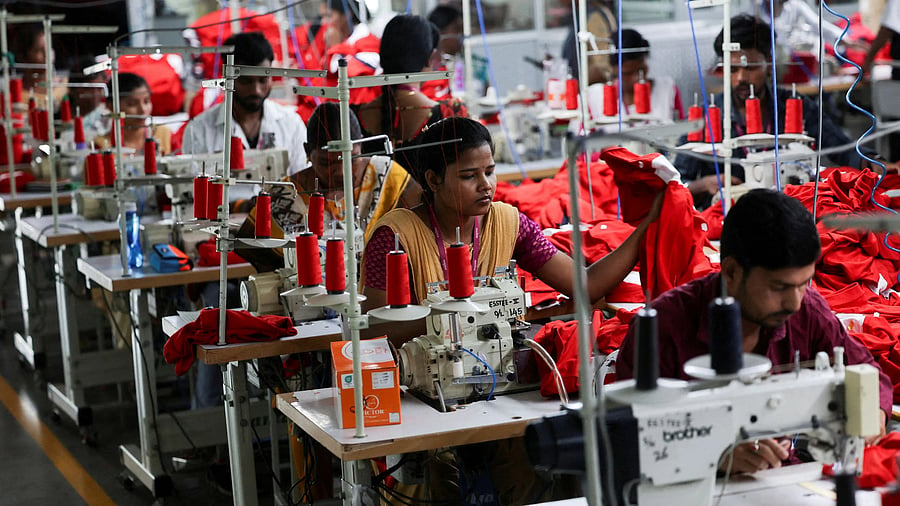
People work at a garment factory in Tiruppur, in the Southern state of Tamil Nadu
Credit: Reuters Photo
Chennai: In a bid to give some relief to the country's textile sector hit by the US' punishing 50% tariff that came into effect on Wednesday, the union government in an order extended an import duty exemption on cotton by three months, until the end of December. Though the waiver of the 11% import duty won’t fully offset the potential losses caused by US tariffs on Indian imports, the textile hubs of Coimbatore and Tiruppur welcomed the move on Thursday, saying it would help cool down yarn prices, which will be highly beneficial for the sector.
The Southern India Mills’ Association (SIMA) acknowledged the decision as timely relief for the textile industry as this extension will not only enable exporters to meet existing commitments but also help seize summer market opportunities overseas. SIMA also urged textile mills and exporters not to panic but to focus on identifying new markets while simultaneously strengthening their presence in the domestic market.
Dr S K Sundararaman, Chairman, SIMA, said the duty waiver will not negatively affect cotton farmers since production has fallen below 295 lakh bales, compared to the industry requirement of 318 lakh bales. He noted this has resulted in the lowest closing stock ever, causing a raw material shortage that could severely impact the capital-intensive cotton value chain, which provides direct employment to nearly 35 million people.
“It is essential to make cotton available at globally competitive prices for the industry to grow, fully consume home-grown cotton, and eventually enable cotton exports when production becomes surplus. Farmers are mainly affected due to a significant drop in productivity and deterioration in fiber quality,” he added.
N Thirukkumaran, General Secretary of the Tiruppur Exporters’ Association (TEA), said the withdrawal of the 11% duty on cotton imports will bring domestic cotton prices in line with imported cotton prices. On Thursday, the price of one candy (356 kg) was Rs 56,000, and imported cotton will be similarly priced due to this decision.
“The move will cool yarn prices and stabilise cotton prices, eliminating fluctuations. This will help us serve markets other than the US effectively and secure fresh orders,” Thirukkumaran told DH.
The SIMA chairman expressed hope that the government will soon announce a series of relief measures and path-breaking policy initiatives to achieve exponential growth in the domestic market.
While other markets can be explored, the general consensus in Tiruppur — the knitwear hub — and Coimbatore, which supplies bed linens, kitchen linens, and towels to the US, is that the US market cannot be replaced due to its sheer volumes and consumers' purchasing power.
Sundararaman expressed hope that the government addresses the GST duty inversion in the man-made fiber (MMF) value chain by placing the entire value chain in the 5% GST slab, on par with cotton. This would make Indian clothing products both cheaper domestically and more competitive globally, he said.